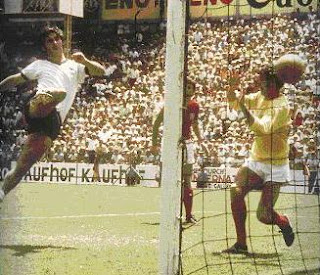1- Event:
Harald
Schumacher’s controversial autobiography in the spring of 1987 that caused
uproar in German soccer circles.
Among
his most controversial claims was that doping was commonplace in the
Bundesliga.
Consequence:
He
was dismissed from the National team setup as well as his club Koln.
This
paved the way for his understudy Bodo Illgner to be elevated as Koln’s number
one goalkeeper.
In
almost no time, he was also elevated to the National Team, first as number two
to Eike Immel and then from the Fall of 1988 as Number one.
 |
Photo
from: Onze, March 1983
(Harald Schumacher) |
 |
Photo
from: Fussball Magazin, May 1987
(Bodo Illgner with Koln, 1986/87) |
2- Event:
The
simultaneous retirements of Alain Giresse, Dominique Rocheteau and Maxime
Bossis from the French National team following the 1986 World Cup.
Consequence:
With
these retirements and the impending retirements in the following year of Michel
Platini, Patrick Battiston and Jean Tigana, the French national team went into
a decline with no ready-made replacements.
This
post-Mexico generation is regarded as the Lost Generation. They failed to
qualify for the 1988 Euros as well as the 1990 World Cup.
3- Event:
Days
prior to England’s quarterfinal clash with West Germany during the 1970 Mexico
World Cup, England’s first choice goalkeeper had to withdraw due to stomach
trouble.
Peter
Bonetti was called in to replace Banks.
Consequence:
The
inexperienced Peter Bonetti was blamed for the defeat after England let a 0 to
2 lead to slip away and lost 2 to 3 on June 14, 1970.
This
became one of the talking points of England’s failure, whether or not Banks
would have saved some of the goals that Bonetti didn’t and other speculation.
 |
Photo
From: World Soccer, April 1970
(Peter Bonetti) |
 |
Photo
From: World Soccer, April 1970
(Gordon Banks) |
 |
Photo
From: Chronik des deutschen fussballs, 2005
(Gerd Muller scoring West Germany’s third with
Bonetti unable to stop, June 14, 1970, World Cup, West Germany 3-England 2) |
4- Event:
1990
World Cup winner and German defender Thomas Berthold was sent off in an EC
Qualifier vs. Wales on June 5, 1991 at Cardiff for kicking Wales’ Kevin
Ratcliffe.
Consequence:
UEFA
suspended Berthold for five competitive matches.
Germany
Manager Berti Vogts announced that Berthold would not be included for the Euro
92 Finals squad, as he would miss the first two matches on suspension.
Around
the same time he had joined Bayern Munich and was unable to adapt and lost his
place.
At
this point any international call-up seemed unlikely.
He
transferred to Stuttgart in 1993 to resurrect his career and was successful by
1994 to return to the National Team and played in the 1994 World Cup.
 |
Photo from : Onze-Mondial, August 1991
(Thomas Berthold and Stuart Pearce, July 4, 1990,
World Cup, West Germany 1-England 1)
|
5- Event:
1)
France Captain and Manchester United’s Eric Cantona’s kung-fu kick vs. Crystal
Palace on January 25, 1995.
2)
France and Newcastle’s David Ginola’s insistence on a starting position with
France Manager Aime Jacquet in the Fall of 1995.
Consequence:
Eric
Cantona was suspended from any Football (Club or International) for almost nine
months.
In
his absence France Manager Aime Jacquet sought to implement and impose a system
built around the playmaking abilities of Zinedine Zidane and as his partner
Youri Djorkaeff.
Ginola’s
demand also forced Jacquet to drop him for good.
With
his suspension over and the upcoming Euros in 1996 to be played in England,
Jacquet wanted Cantona to be re-integrated but as a center forward as his
system with Zidane seemed to be functioning.
Cantona refused and never played for France
again.
 |
Photo from : Onze-Mondial, November 1995
(Zinedine Zidane and Youri Djorkaeff)
|
 |
Photo
From: The Game, September 1995
(David Ginola with Newcastle, 1995/96) |
 |
Photo
From: Total Football, August 2001
(Eric Cantona’s Kung-Fu Kick, January 25, 1995,
EPL, Crystal Palace 1-Manchester United 1) |


No comments:
Post a Comment